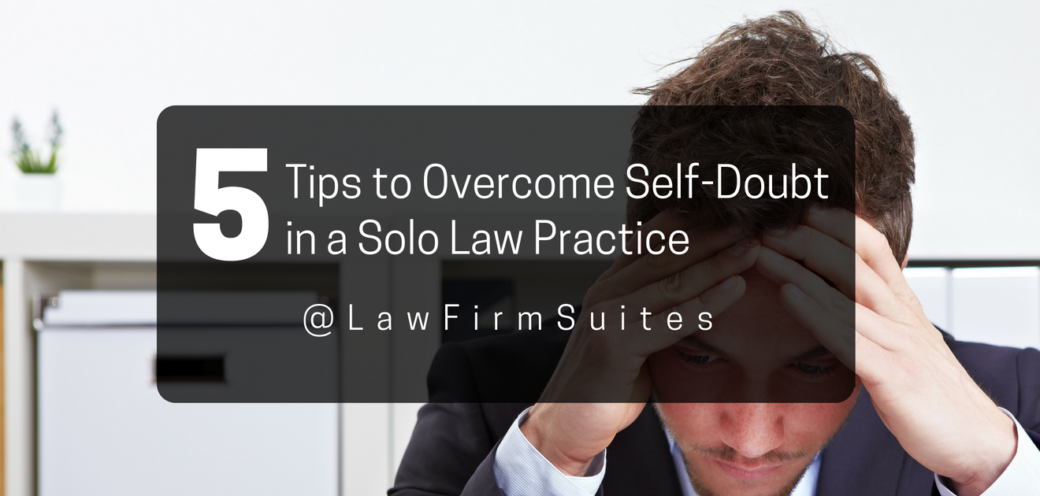Five strategies for solo lawyers that boost professional confidence and show self-doubt to the door.
Solo corporate and M&A attorney, Aimee B. Davis, has an irrational fear of heights. She learned this several years ago on a trip to the Vatican.
While climbing to the top of the cupola, Davis had visions of a strong wind that would sweep her off the balustrade, carrying her to a dramatic death in the center of St. Peter’s Square. Though she knew what she was experiencing was completely illogical, she had to consciously stop herself from hyperventilating.
Davis has been practicing corporate law for 22 years in New York, most of her career in Biglaw firms. In a recent article in her law firm’s blog, Davis (refreshingly) admitted to her readers that, even after years of years of legal practice, she still experiences feelings of self-doubt when taking on a new client or contract.
We put on a brave face in front of clients, adversaries and judges. But many lawyers, especially those new to solo practice, are riddled with self-doubt.
From the outside, you look confident, capable and in charge. On the inside, you might be falling apart. It’s a common mountain that everyone has to scale. Some lawyers even say they feel like a fraud or impostor, at least in the early career stages.
You could call it Impostor Syndrome. Everyone around you might appear to have their act together. They have more experience and never wrestle with doubt. And even when you enjoy a little success, it’s only short lived before you wonder whether it was nothing but luck. Think you’re alone? Hardly.
No one is born with confidence in their abilities; that comes with practice, self-training and learning how to manage your nervousness. Here are five strategies that can help you cultivate confidence for yourself.
#1: Let Go of the Past
Self-doubt usually stems from memories. If you hold onto times when you didn’t perform the way that you’d hoped or when someone else pointed out a flaw, you’re living in the past. Instead, live in the present.
Try to avoid feeding those memories and work on building new and better ones. Wherever your focus lies, that’s what will grow and thrive.
#2: Make a List of Accomplishments
You already have a mental list of reasons – probably a mile long – why you feel like an impostor. Now it’s time to make a new list. This time, fill it with everything that you’ve accomplished. Every lawyer finished law school, obviously. But don’t discount that as an achievement. The vast majority of people, and most of your clients, can’t say the same.
If you can’t accept your own accomplishments, you might need a little outside help. Trusted friends and peers could probably write the list for you, at least metaphorically. And you might be surprised by what they have to say.
#3: Understand Your Trigger Moments
Just when everything is going great, a wave of self-doubt can crash over you. But those waves rarely appear from out of nowhere. Find out what triggers them and then you can put countermeasures in place.
In the case of Aimee Davis, when she feels uncertain about a new client or matter, she has learned to ask herself a set of questions that include:
- Will I identify and find the most efficient solutions to address the biggest business risks my client faces in doing the deal at hand?
- How can I clarify and tighten the language in the proposed contract to best protect my client’s business objectives?
- How can I provide value to my client in light of the time and money being spent engaging in this and in future transactions?
This has allowed her to harness her nervous energy and redirect it into her work.
Everyone’s triggers are different. Yours might be as simple as a phrase that reminds you of a past disappointment. Once you identify those triggers, you can begin relating them to a completely new feeling. It’s an exercise in psychology. Some people refer to professional counseling to learn to wield those tools effectively.
#4: Help Other Lawyers
It might seem ridiculous to offer help when you lack confidence in yourself. But, your own strengths might surprise you. There’s always someone who is at least slightly behind your level of progress and experience.
Offer a helping hand to others who are struggling, and you could see abilities and expertise you didn’t realize you had. Beyond learning more about yourself, helping others is just good karma.
#5: Forget About Perfection
Nobody is perfect. Your mom probably told you that – and it’s true. Every peer whom you admire has professional and personal insecurities. Psychologists say that, often, the ones who exude extreme confidence struggle most with insecurities.
Perfection isn’t possible. By default, imperfection is normal. Stop waiting to eliminate self-doubt. Learn to accept and deal with it as a normal part of intellectual and professional growth.
Impostor Syndrome can affect anyone, especially a solo lawyer. The bigger problem is that, if you truly believe that you’re not capable, those thoughts might become self-fulfilling prophecies.
The only way to get past a lack of confidence is to work through it. Whether or not you can see it now, every successful lawyer has been in your shoes at some time. They kept moving forward. So should you.
Aimee Davis continues to push herself both professionally and personally. She recently tried aerial yoga for the first time. Anticipating her paralyzing fear of heights, rather than giving into it, she resigned herself to trusting her instructor. In the end, she felt a sense of accomplishment while hanging freely upside down in the air.


